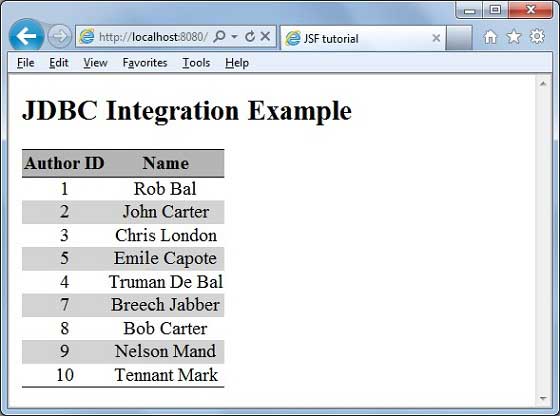Database requirements to run this example
| S.N. | Software & Description |
|---|---|
| 1 | PostgreSQL 9.1 Open Source and light weight database |
| 2 | PostgreSQL JDBC4 Driver JDBC driver for PostgreSQL 9.1 and JDK 1.5 or above |
Database SQL Commands
create user user1; create database testdb with owner=user1; CREATE TABLE IF NOT EXISTS authors ( id int PRIMARY KEY, name VARCHAR(25) ); INSERT INTO authors(id, name) VALUES(1, 'Rob Bal'); INSERT INTO authors(id, name) VALUES(2, 'John Carter'); INSERT INTO authors(id, name) VALUES(3, 'Chris London'); INSERT INTO authors(id, name) VALUES(4, 'Truman De Bal'); INSERT INTO authors(id, name) VALUES(5, 'Emile Capote'); INSERT INTO authors(id, name) VALUES(7, 'Breech Jabber'); INSERT INTO authors(id, name) VALUES(8, 'Bob Carter'); INSERT INTO authors(id, name) VALUES(9, 'Nelson Mand'); INSERT INTO authors(id, name) VALUES(10, 'Tennant Mark'); alter user user1 with password 'user1'; grant all on authors to user1;
Example Application
Let us create a test JSF application to test jdbc integration.| Step | Description |
|---|---|
| 1 | Create a project with a name helloworld under a package com.tutorialspoint.test as explained in the JSF - First Application chapter. |
| 2 | Create resources folder under src > main folder. |
| 3 | Create css folder under src > main > resources folder. |
| 4 | Create styles.css file under src > main > resources > css folder. |
| 5 | Modify styles.css file as explained below. |
| 6 | Modify pom.xml as explained below. |
| 7 | Create Author.java under package com.tutorialspoint.test as explained below. |
| 8 | Create UserData.java under package com.tutorialspoint.test as explained below. |
| 9 | Modify home.xhtml as explained below. Keep rest of the files unchanged. |
| 10 | Compile and run the application to make sure business logic is working as per the requirements. |
| 11 | Finally, build the application in the form of war file and deploy it in Apache Tomcat Webserver. |
| 12 | Launch your web application using appropriate URL as explained below in the last step. |
styles.css
.authorTable{ border-collapse:collapse; border-bottom:1px solid #000000; } .authorTableHeader{ text-align:center; background:none repeat scroll 0 0 #B5B5B5; border-bottom:1px solid #000000; border-top:1px solid #000000; padding:2px; } .authorTableOddRow{ text-align:center; background:none repeat scroll 0 0 #FFFFFFF; } .authorTableEvenRow{ text-align:center; background:none repeat scroll 0 0 #D3D3D3; }
pom.xml
<project xmlns="http://maven.apache.org/POM/4.0.0" xmlns:xsi="http://www.w3.org/2001/XMLSchema-instance" xsi:schemaLocation="http://maven.apache.org/POM/4.0.0 http://maven.apache.org/maven-v4_0_0.xsd"> <modelVersion>4.0.0</modelVersion> <groupId>com.tutorialspoint.test</groupId> <artifactId>helloworld</artifactId> <packaging>war</packaging> <version>1.0-SNAPSHOT</version> <name>helloworld Maven Webapp</name> <url>http://maven.apache.org</url> <dependencies> <dependency> <groupId>junit</groupId> <artifactId>junit</artifactId> <version>3.8.1</version> <scope>test</scope> </dependency> <dependency> <groupId>com.sun.faces</groupId> <artifactId>jsf-api</artifactId> <version>2.1.7</version> </dependency> <dependency> <groupId>com.sun.faces</groupId> <artifactId>jsf-impl</artifactId> <version>2.1.7</version> </dependency> <dependency> <groupId>javax.servlet</groupId> <artifactId>jstl</artifactId> <version>1.2</version> </dependency> <dependency> <groupId>postgresql</groupId> <artifactId>postgresql</artifactId> <version>9.1-901.jdbc4</version> </dependency> </dependencies> <build> <finalName>helloworld</finalName> <plugins> <plugin> <groupId>org.apache.maven.plugins</groupId> <artifactId>maven-compiler-plugin</artifactId> <version>2.3.1</version> <configuration> <source>1.6</source> <target>1.6</target> </configuration> </plugin> <plugin> <artifactId>maven-resources-plugin</artifactId> <version>2.6</version> <executions> <execution> <id>copy-resources</id> <phase>validate</phase> <goals> <goal>copy-resources</goal> </goals> <configuration> <outputDirectory>${basedir}/target/helloworld/resources </outputDirectory> <resources> <resource> <directory>src/main/resources</directory> <filtering>true</filtering> </resource> </resources> </configuration> </execution> </executions> </plugin> </plugins> </build> </project>
Author.java
package com.tutorialspoint.test; public class Author { int id; String name; public String getName() { return name; } public void setName(String name) { this.name = name; } public int getId() { return id; } public void setId(int id) { this.id = id; } }
UserData.java
package com.tutorialspoint.test; import java.io.Serializable; import java.sql.Connection; import java.sql.DriverManager; import java.sql.PreparedStatement; import java.sql.ResultSet; import java.sql.SQLException; import java.util.ArrayList; import java.util.List; import javax.faces.bean.ManagedBean; import javax.faces.bean.SessionScoped; import javax.faces.event.ComponentSystemEvent; @ManagedBean(name = "userData", eager = true) @SessionScoped public class UserData implements Serializable { private static final long serialVersionUID = 1L; public List<Author> getAuthors(){ ResultSet rs = null; PreparedStatement pst = null; Connection con = getConnection(); String stm = "Select * from authors"; List<Author> records = new ArrayList<Author>(); try { pst = con.prepareStatement(stm); pst.execute(); rs = pst.getResultSet(); while(rs.next()){ Author author = new Author(); author.setId(rs.getInt(1)); author.setName(rs.getString(2)); records.add(author); } } catch (SQLException e) { e.printStackTrace(); } return records; } public Connection getConnection(){ Connection con = null; String url = "jdbc:postgresql://localhost/testdb"; String user = "user1"; String password = "user1"; try { con = DriverManager.getConnection(url, user, password); System.out.println("Connection completed."); } catch (SQLException ex) { System.out.println(ex.getMessage()); } finally{ } return con; } }
home.xhtml
<?xml version="1.0" encoding="UTF-8"?> <!DOCTYPE html PUBLIC "-//W3C//DTD XHTML 1.0 Transitional//EN" "http://www.w3.org/TR/xhtml1/DTD/xhtml1-transitional.dtd"> <html xmlns="http://www.w3.org/1999/xhtml" xmlns:f="http://java.sun.com/jsf/core" xmlns:h="http://java.sun.com/jsf/html"> <h:head> <title>JSF Tutorial!</title> <h:outputStylesheet library="css" name="styles.css" /> </h:head> <h2>JDBC Integration Example</h2> <h:dataTable value="#{userData.authors}" var="c" styleClass="authorTable" headerClass="authorTableHeader" rowClasses="authorTableOddRow,authorTableEvenRow"> <h:column><f:facet name="header">Author ID</f:facet> #{c.id} </h:column> <h:column><f:facet name="header">Name</f:facet> #{c.name} </h:column> </h:dataTable> </h:body> </html>Once you are ready with all the changes done, let us compile and run the application as we did in JSF - First Application chapter. If everything is fine with your application, this will produce following result:


No comments:
Post a Comment